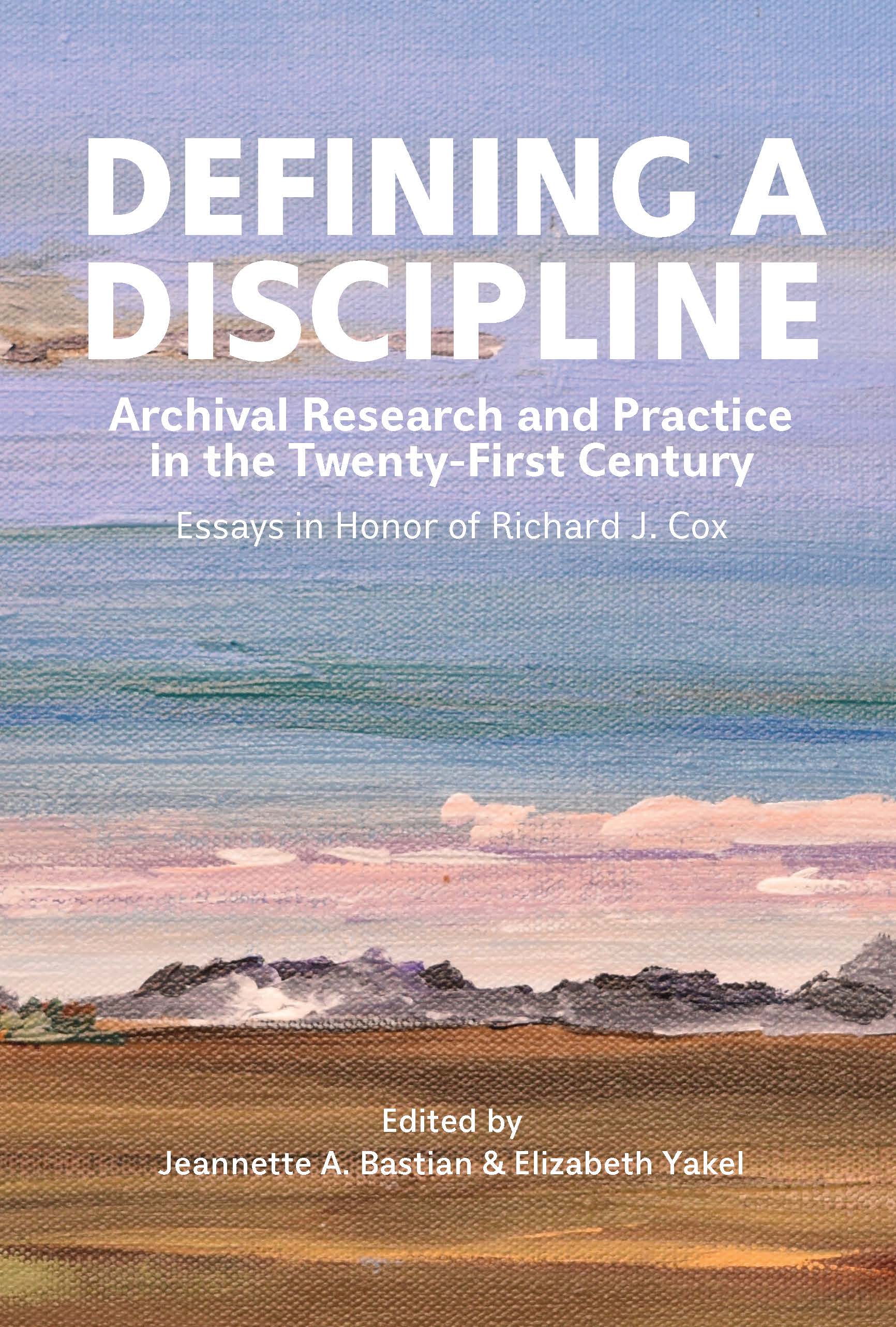- About Archives
- About SAA
- Careers
- Education
- Publications
- Advocacy
- Membership
Defining a Discipline: Archival Research and Practice in the 21st Century – Essays in Honor of Richard J. Cox, a new book edited by Jeannette A. Bastian (Simmons College) and Elizabeth Yakel (University of Michigan), was published by the Society of American Archivists in March 2020.
 The book presents a mosaic of the research that represents the current state of archival science and introduces themes that will carry the profession into the future as a complex academic discipline. As the archival profession in the United States continues to evolve, Defining a Discipline honors one of its most prolific and influential thinkers and writers, Richard J. Cox, who retired from the profession in 2017 after a 45-year career.
The book presents a mosaic of the research that represents the current state of archival science and introduces themes that will carry the profession into the future as a complex academic discipline. As the archival profession in the United States continues to evolve, Defining a Discipline honors one of its most prolific and influential thinkers and writers, Richard J. Cox, who retired from the profession in 2017 after a 45-year career.
The book is divided into four sections that address archival themes championed by Cox: accountability and evidence, ethics and education, archival history, and memory. Incisive essays pay tribute to Cox while interpreting these themes in ways that speak to the archival future, guiding readers toward an understanding of archival science as a discipline in its own right. Contributors include Janet Ceja Alcalá, Simmons University; Joel A. Blanco-Rivera, National School of Conservation; Gracen Brilmyer, University of California, Los Angeles; Kathy Carbone, University of California, Los Angeles; Michelle Caswell, University of California, Los Angeles; Wendy Duff, University of Toronto; Luciana Duranti, University of British Columbia; Joyce Gabiola, AAPI LGBTQ+ Archiving Collective in Los Angeles; Patricia Galloway, University of Texas at Austin; Anne J. Gilliland, University of California, Los Angeles; Alison Langmead, University of Pittsburgh; Heather MacNeil, University of Toronto; Eleanor “Nora” Mattern, University of Pittsburgh; Lindsay Kistler Mattock, University of Iowa; James M. O’Toole, Boston College; Robert B. Riter, University of Alabama; Donghee Sinn, University at Albany; Heather Soyka, Kent State University; Jefferson Sporn, University of Toronto; Tonia Sutherland, University of Hawaiʻi at Mānoa; David A. Wallace, University of Michigan School of Information; Jimmy Zavala, University of California, Irvine.
Defining a Discipline demonstrates the importance of the role of archivists, archives, and archival institutions in communities, organizations, and the digital environment. It looks forward—a direction that the pioneering Cox promoted throughout his career.
Many educational games are Drive mad designed to teach specific subjects like math, science, or language, making learning interactive and fun.
I’ve played a lot of rhythm games, but Fnf tands out because of its personality. It’s not just about hitting notes on time; it’s about the playful interactions between Boyfriend and his opponents, the catchy music, and the fun visual style. It’s a rhythm game with heart
In today's information society, where access to knowledge is unprecedented, it is important to be able to filter and use this information properly. This is especially true in the field of health, where every step towards the right information can make a big difference to our future well-being. Working with experienced professionals, such as the team at https://curaveindoctors.com/ , can help us find the most relevant and reliable data to keep our health at a high level.
Thank you for highlighting the significance of "Defining a Discipline" in capturing the current state and future trajectory of archival science. It's commendable to honor Richard J. Cox's contributions to the field after his influential 45-year career. For those seeking similar depth and insight in academic writing, resources like https://www.nursingpaper.com/ can provide valuable support and expertise.
Such an awesome post. Keep us updated! fort wayne chevy dealer
So grateful to have a team focused on archival science out there. I believe the scienece behind everything from janitors Chicago to moss removal Seattle should be archived securely not only for modern scientists but for people in the far-flung future to understand.
Choosing to start company in estonia start company in estonia offers entrepreneurs a streamlined and fully digital business environment. Estonia’s e-Residency program enables global founders to register, manage, and grow their companies remotely with minimal bureaucracy. The country provides transparent taxation, modern legislation, and access to the European single market. For digital nomads, freelancers, and tech businesses, Estonia remains one of the most attractive jurisdictions for easy and efficient company formation.